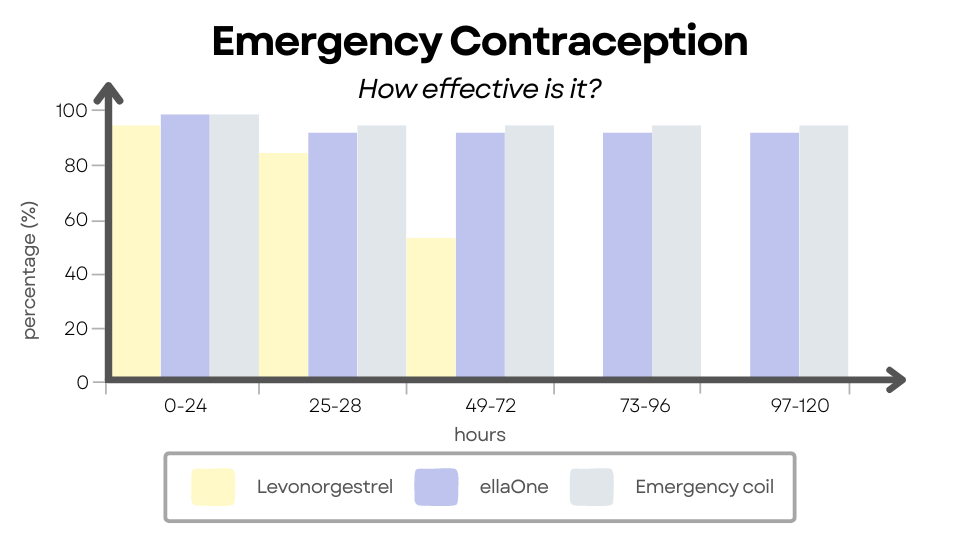How Long After Sex Can You Take The Morning After Pill?
Table of Contents
Understanding the window of effectiveness for the morning after pill is crucial for making informed decisions about emergency contraception. Whether you’ve had unprotected sex or experienced contraceptive failure, knowing how long you have to take the morning after pill can significantly impact its effectiveness. Different types of emergency contraception have varying timelines, ranging from 72 hours (3 days) to 120 hours (5 days) after intercourse. This blog explores the details of when and how to use emergency contraception effectively, ensuring you have the knowledge needed to make timely and informed choices for your reproductive health.
When to take the morning after pill
When considering the morning after pill, timing is critical for its effectiveness in preventing unintended pregnancy. The two main types of emergency contraception available are levonorgestrel (e.g., Plan B One-Step, Levonelle) and ulipristal acetate (e.g., ellaOne). Levonorgestrel is most effective when taken within 72 hours (3 days) after unprotected sex, though its efficacy diminishes over time. Ulipristal acetate remains effective for up to 120 hours (5 days) post-intercourse and maintains higher efficacy as time passes compared to levonorgestrel. It is crucial to take emergency contraception as soon as possible after unprotected intercourse to maximize its effectiveness.
Can you take the morning after pill after 5 days?
The ability to take the morning after pill after 5 days depends on the type of emergency contraception you are considering:
- Levonorgestrel (e.g., Plan B One-Step, Levonelle): This emergency contraception is generally recommended to be taken within 72 hours (3 days) after unprotected sex. While it may still offer some effectiveness up to 5 days after intercourse, its efficacy decreases significantly beyond the recommended timeframe.
- Ulipristal acetate (e.g., ellaOne): This type of emergency contraception can be effective up to 120 hours (5 days) after unprotected sex. It maintains higher efficacy compared to levonorgestrel as time passes, making it a more suitable option if emergency contraception is needed closer to the 5-day mark.
It’s important to note that the effectiveness of emergency contraception decreases with time after unprotected intercourse. While ulipristal acetate is designed to remain effective for up to 5 days, its efficacy decreases with each passing day. Taking emergency contraception as soon as possible after unprotected sex is always recommended to maximize its effectiveness in preventing pregnancy. If 5 days have passed since unprotected intercourse, it’s still advisable to consult our pharmacist for guidance on the best course of action based on individual circumstances.

Taking the morning after pill after 7 days
Taking the morning after pill 7 days after unprotected intercourse is not recommended for two main reasons:
- Effectiveness: Both types of emergency contraception (levonorgestrel and ulipristal acetate) are designed to prevent pregnancy primarily within a specific window after unprotected sex. Levonorgestrel (Plan B One-Step, Levonelle) is most effective when taken within 72 hours (3 days), with reduced effectiveness thereafter. Ulipristal acetate (ellaOne) is effective for up to 120 hours (5 days), but its efficacy also decreases significantly after this timeframe. By 7 days, the likelihood of preventing pregnancy with emergency contraception is greatly diminished.
- Medical guidelines: According to medical guidelines, emergency contraception should be taken as soon as possible after unprotected intercourse to maximize its effectiveness. Waiting for 7 days significantly exceeds the recommended window for both types of emergency contraception.
If 7 days have passed since unprotected intercourse and pregnancy prevention is still a concern, it is advisable to consult our pharmacist. They can provide guidance on alternative options or methods appropriate for the situation.
Who can use the emergency pill?
It can be used by:
- Women of reproductive age: Typically, emergency contraception is recommended for women who are sexually active and at risk of unintended pregnancy.
- Those who are not using regular contraception: Emergency contraception serves as a backup method when regular contraception was not used or failed (e.g., condom breakage, missed birth control pills).
- Those concerned about contraceptive failure: Individuals who are concerned that their regular contraception method may have failed (e.g., condom slipped off, missed birth control pills).
- Those who have experienced sexual assault: Emergency contraception may be used following sexual assault to prevent pregnancy.
However, it’s important to note that emergency contraception is not intended for regular use as a primary method of contraception. It does not protect against sexually transmitted infections (STIs), and repeated use can disrupt menstrual cycles. For ongoing contraception needs, individuals should consider using regular and more reliable methods of birth control recommended by our pharmacist.
Contact a doctor or nurse if:
You’ve used emergency contraception and:
- You’re concerned about any symptoms
- You think you might be pregnant
- Your next period is more than 7 days late
- Your period is shorter or lighter than usual
- You have any sudden or unusual pain in your lower abdomen
Sudden or unusual pain in your lower abdomen (stomach) could be a sign of an ectopic pregnancy. This is rare but serious and needs immediate medical attention.
Morning after pill FAQs
Can I use the morning after pill as my regular method of contraception?
No, the morning after pill is not intended for regular use. It is meant to be used as emergency contraception after unprotected sex or contraceptive failure. Using it frequently can disrupt your menstrual cycle and is less effective than regular contraception methods like birth control pills, condoms, or intrauterine devices (IUDs).
What should I do if I vomit after taking the morning after pill?
If you vomit within two hours of taking the morning after pill, it may not have been fully absorbed by your body. In such cases, it is recommended to take another dose. Consult with our pharmacist for personalised advice.
Does the morning after pill protect against sexually transmitted infections (STIs)?
No, the morning after pill does not protect against sexually transmitted infections (STIs). It only helps to prevent pregnancy. If you are concerned about STIs, use condoms consistently and correctly.
Can I take the morning after pill multiple times in the same menstrual cycle?
While emergency contraception is safe to use occasionally, it should not be relied upon as a regular method of contraception. If you find yourself needing emergency contraception more than once in a menstrual cycle, consider discussing more reliable contraception options with our pharmacist.

